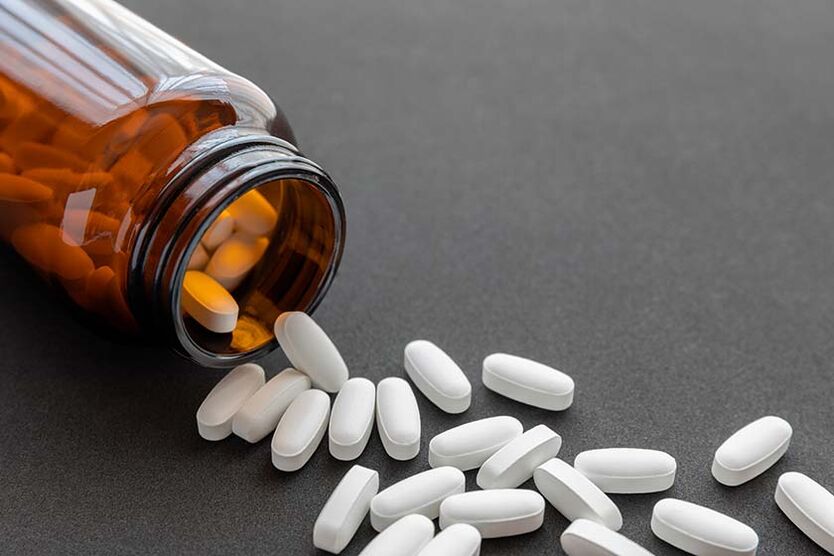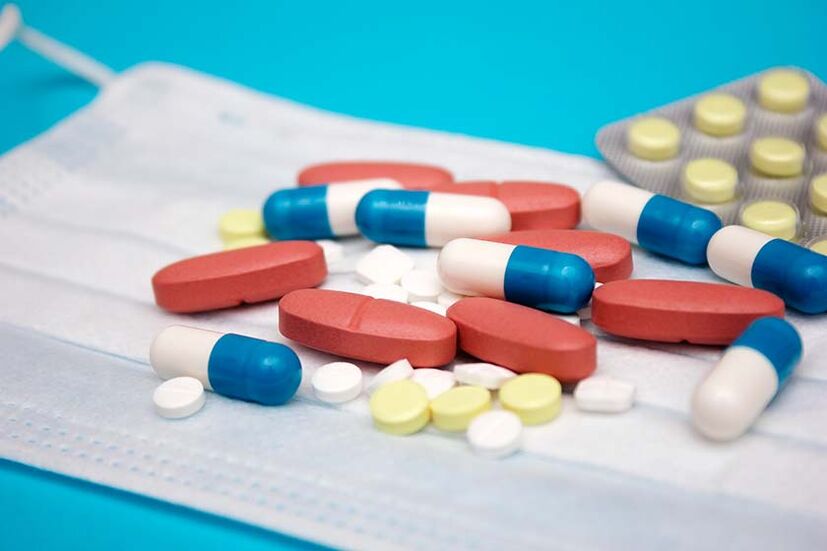Scientists do not agree if alcohol is compatible with antibacterial drugs.Some experts suggest that taking alcohol after completing the processing price does not lead to deterioration in health.There are many more opponents of this approach among doctors.
Refusal to drink during and after treatment: what experts say
The composition of antibacterial drugs includes synthetic substances that destroy viral microorganisms.They are prescribed when ordinary drugs are useless.On the one hand, antibacterial drugs help cure people of very serious illnesses.On the other hand, the drugs in this group have high toxicity.It is not without reason that doctors recommend drinking hepatoprotectors during treatment to hold the liver.
Alcohol after antibiotics considerably increases the load on the body.Whether to consume alcohol during antibiotic treatment, the question is open.
Experts identify several reasons why you should refuse to drink during therapy:
- Alcohol level The effect of taking medication.The active substances of antibiotics interact with the proteins of microorganisms, affect them, modifying the structure.Alcohol molecules modify proteins, weaken chemical bonds.
- The liver knows heavy loads during treatment with all drugs.If a person drinks, he creates additional stress for the body.Consequently, toxic hepatitis is developing, intrahepatic cholestasis, the exit of bile is difficult, the inflammatory process develops in bile ducts and liver.
- The interaction of alcohol with antibiotics can cause a significant deterioration of well-being.Disulfiram reactions are accompanied by fever, nausea, headache, in the worst case, they can lead to coma and death.The drugs in this group are used in the treatment of alcoholism.
Alcoholic beverages contain substances that contribute to the too rapid absorption of drugs in the intestines and even faster, they eliminate them.
How long after the antibiotic lesson can you drink alcohol?The term depends on the medication and the duration of the therapy prices.Certain types of antifungal drugs, as well as penicillin, heliomycin are compatible with strong drinks in small doses.To avoid the unpleasant consequences, it is advisable to abandon them completely or to consult a doctor.Combine alcohol and antibacterial drugs should be in exceptional cases.
3-5 days after the end of antibiotics, doctors allow you to drink alcohol.This time is sufficient for toxic substances to eliminate the body, and it can adequately respond to alcohol.If the patient suffers from chronic forms of diseases and repeatedly uses treatment with antibacterial drugs, to take alcohol, you should abstain for 2 to 4 weeks.

Alcohol after antibiotics: perspectives and consequences
The opinion that absolute alcohol is incompatible with no drug has no clinically confirmed facts.It is a myth.There are separate types of therapy, during which doctors recommend exclusion from alcohol.The consequences of use will not necessarily be fatal, but the prospect of developing possible complications is large.
The table below shows examples of negative body alcohol reactions.It should be noted that an unpredictable situation can develop in response to the taking of completely "harmless" drugs.To find out how much you can drink alcohol after antibiotics, you can have your doctor before taking medication.
| Types of drugs | The result of a combination with alcohol |
| Aspirin | Stomach ulcer |
| Caffeine, ephedrine. | Hypertensive crisis |
| Diuretic, hypotensative. | A sharp decrease in pressure |
| Paracetamol | Toxic liver damage |
| Insulin, drugs down with sugar. | Blood sugar Falling, Coma |
| Neuroleptic, analgesic, anti-inflammatory | Poisoning. |
| Transquilizers, sleeping pills | Intoxication, coma |
| Sulfamylamides | Lack of effect, intolerance to individual substances. |
| Niprolcer, antihistamine | Allergy, increased pain |
The preparations of the Céphetane group slow down the chemical reaction to the fractionation of alcohol molecules.Consequently, a person experiences all signs of poisoning: dizzy, vomiting, headache, breathlessness.Disulfir is a high content of anti-alcohol components that are used in narcology to treat dependencies.The smallest dose of alcohol is getting worse.The minimum abstinence of the use of strong drinks is a week.
Another drug, badly combined with alcohol - metronidozole.Alcohol after this antibiotic leads to intoxication.However, this judgment is not scientifically confirmed.In 2003, medical scientists conducted an experience.A small group of Finnish men was invited to drink alcohol regularly during treatment with metronisol, then share the result.5 days after the start of taking antibiotics, it turned out that there was no negative effect of alcohol.The study organizers stressed that to avoid negative consequences, you should not combine strong drinks with metronidazole.
There are several other groups of drugs, which cannot be combined with alcohol:
- Tinedazole;
- Linezolide;
- Erythromycin;
- Sodium thiosulfate;
- Metadoxin;
- Cyanamide;
- Calcium carbide;
- Disulfits;
- Lithium Nicotinat;
- Naltrexon;
- Dimerkaprol;
- Nalmefen.
Doctors immediately warn patients in the danger and the consequences of the combination of antibacterial drugs with alcohol.
The question is, after the amount of alcohol possible after the interest of antibiotics by many citizens.I would like to use strong drinks without fear.These fears are not in vain.
The result of the combination of a drink with antibiotics:
- The transition of the disease to a chronic form.Microorganisms become resistant to a particular substance, the effect of therapy disappears.The processing process is delayed.
- Deterioration of blood indicators.An increase in coagulation leads to the development of cardiovascular pathologies.The risk of stroke or heart attack increases several times.
- The appearance of allergic reactions.A light attack is stopped by antihistamine drugs.In severe form, the anaphylactic shock and the edema of quincke develops.
Find out how much you can drink alcohol after antibiotics, you can, consulted with a doctor.
Compatible drugs
Doctors allow a combination of strong drinks with certain types of antibacterial drugs.List of "safe" antibiotics:
- cephalosporins;
- penicillin preparations;
- Macrolides.
A patient taking penicillin -based drugs should refrain from drinking 4 to 5 hours after the end of the course.Meanwhile, the active substances of the drug dissolve and decompose.Disintegration products are excreted via the excretory system.
Scientific approach
The researchers conducted a survey among the population of England.Of the 300 patients, the clinic more than 80% believes that the drink negatively affects the effect of drugs, 71% are afraid of the consequences of such a combination.
The truth is that the greatest danger lies in the formation of drug resistance.Microorganisms become resistant when there is a non-systematic drug.The patient, in intoxication, is afraid of the consequences, so he refuses to continue the treatment.
Why can't you drink alcohol during treatment with antibacterial drugs?The systematic abuse of drink in combination with serious drugs can lead to a dysfunction of the work of the organs until they refuse.Systematic drink aggravates the work of immunity, so that the risk of developing various pathologies increases.

Body restoration: recommendations
How long after taking alcohol is necessary to recover after an antibiotic?What is the deadline for breeding a particular drug, can say a doctor.Depending on the type of antibacterial medication, this period can be stretched for several days.An important criterion is the duration of the course.The longer the treatment, the more time it takes for rehabilitation.
Doctors do not allow to drink alcohol after antibiotics in several cases:
- The presence of diseases occurring in a chronic form in which the liver undergoes a toxic load.
- Simultaneously take other drugs.The recovery period in this case is delayed at 6 months.
Experts say: for the complete rehabilitation of the body after an antibiotic course, 1 year is necessary.At present, a person has considerably increased the risk of a cold, flu and other infectious diseases.
The intestines are experiencing a significant charge during medication.Digestion is disturbed, metabolism slows down, vitamins are poorly absorbed, allergic reactions are exacerbated.
Experts agree that you can drink alcohol after antibiotics at the start of a few weeks after the cessation of therapy.In some cases, it is recommended to reduce the use of alcohol consumption at least.
You can help your normal body drinking a probiotic course.They are rich in bifido and lactobacilli, vitamins, amino acids, enzymes.Probiotics drink during or after the end of treatment for 2 to 3 weeks.
The advantages of the product:
- Reduction of toxic load on the liver and kidneys;
- strengthen immunity;
- restoration of the balance of intestinal microflora (local immunity);
- normalization of the digestive process;
- block toxins and allergens;
- Improvement of the assimilation of vitamins.
In the event of violation of the course of treatment with antibiotics, the risk of resistance increases.
Alcohol after antibiotics: after how long you can alcohol
The excretion time of certain antibiotics is individual.The blood system and the vessels are released from the aminoglycosides within 3 hours.The unlucky vestiges of drugs located in intrauterine liquid leave the body after 2 weeks.The uncontrolled use of strong drinks before this period can cause absolute deafness.
If the use of drugs was repeatedly, doctors recommend that you wait for the use of strong drinks.This applies to all groups of drugs.You cannot drink alcohol after antibiotics the same day or in a few hours after treatment.
Drinks belonging to the light alcohol category (beer, wine) are allowed to drink 3 to 5 days after the end of treatment.With stronger alcohol, it is necessary to postpone.Doctors advise you to wait 10-12 days.The reluctance to follow has negative consequences until the patient's death.























